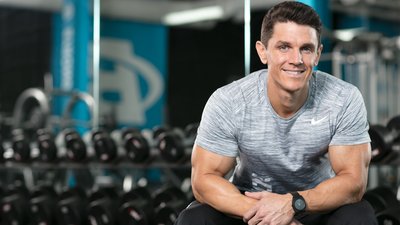Team Bodybuilding.com athlete Jason Wittrock admits he was bit of a hell raiser in his early years. Strangely enough, this proved to be the genesis of his fitness career.
"I got grounded a lot, and every time I got sent to my room, I would do push-ups and sit-ups—hundreds and hundreds of reps," he says. "I just got lost in it."
As Wittrock explains, exercise helped him work through a lot of his anger and aggression to finally outgrow his troublemaker ways.
Utilizing exercise to overcome adversity served Wittrock well in the years that followed. While still in high school, he and his family suddenly lost everything. Their house burned to the ground days before Christmas.
"I looked down at the clothes I had on—it wasn't even my shirt, I was borrowing it from a friend—and I thought, 'This is it. This is all I have,'" says Wittrock.
Shaken but determined, Wittrock refused to allow the loss of all he had to define his path—or determine his future.
"It shook me to the core, losing everything. You don't know what you're going to do. But I decided to turn shit into sugar. I set off from nothing to create myself."
Wittrock understood success is not about what you have, it's about who you are at your core.
Fulfilling His Fitness Destiny
Proving setbacks and devastation are just a small part of the journey, Wittrock set out to become the elite trainer and athlete he is today. He credits the importance of visualization and determination in his ability to rise above adversity.
"I have ups and downs just like everybody else," he says. "I just know my destiny is to help people change their lives. It's what I'm good at. It's what I was born to do."
And Wittrock certainly has changed lives. Years of establishing himself as a successful trainer gave Wittrock the opportunity to apply his skills in a new way—helping people with mental illnesses improve and recover through exercise. He was brought in as part of a study using different therapies to help young adults ages 18 to 25 who suffered from psychological afflictions ranging from bipolar disorder to schizophrenia. Wittrock's task? Using fitness to change their lives.
"One guy came into the gym who had tried to kill himself two days before," remembers Wittrock. "That was just a huge eye opener for me. Up until that point, I was in the gym helping people get bigger biceps, people that wanted to get shredded, to look like me. Now here I was training someone who has scars all over his arms."
Knowing on a personal level how exercise can positively affect a person's mental or emotional state, Wittrock applied his knowledge in the only way he knew how—by training these individuals like he would any other client.
"It was amazing to see," says Wittrock. "After every set, they were just elated—they didn't care how much weight they were lifting, they didn't care how good their form was. They knew that after that set they felt amazing. They felt like they had a purpose."
Changing as Many Lives as Possible
Through this experience, Wittrock saw the truly life-saving potential of exercise. His participants made significant progress not only in their physical health, but also in their mental health.
"Their self-esteem, their self-worth, their confidence—everything went through the roof," he says. "Their success in the gym actually improved their performance in other rehabilitation programs."
Wittrock knows challenges and setbacks are a part of life, but his own personal ordeals have done little to dampen his optimism or his purpose.
"Adversity is just part of the game—nobody's immune to it," he says. "You have to know clearly in your mind where you want to go. You have to be able to see yourself standing at the top of that mountain. Changing as many lives as possible—that's the path I'm on."

